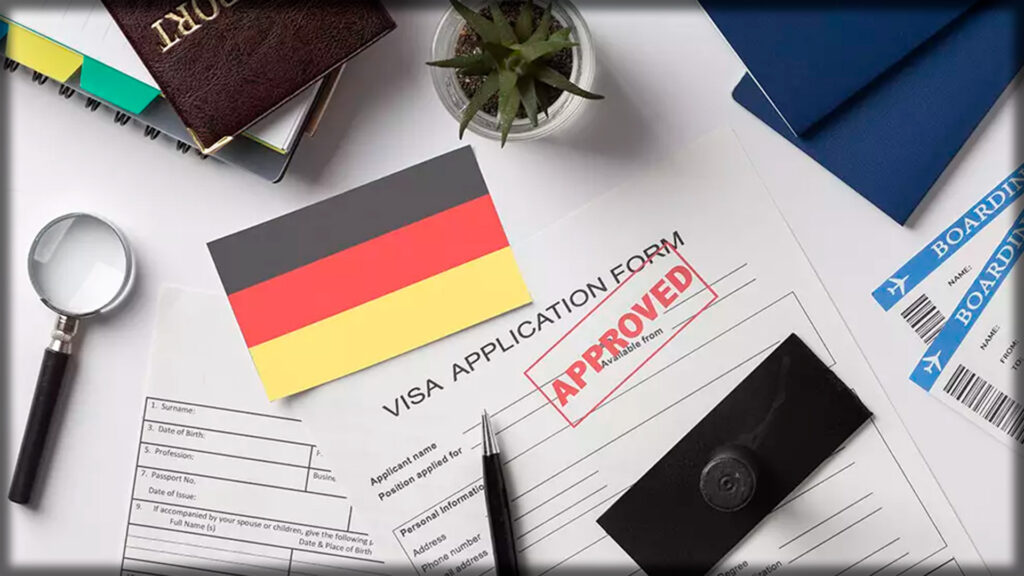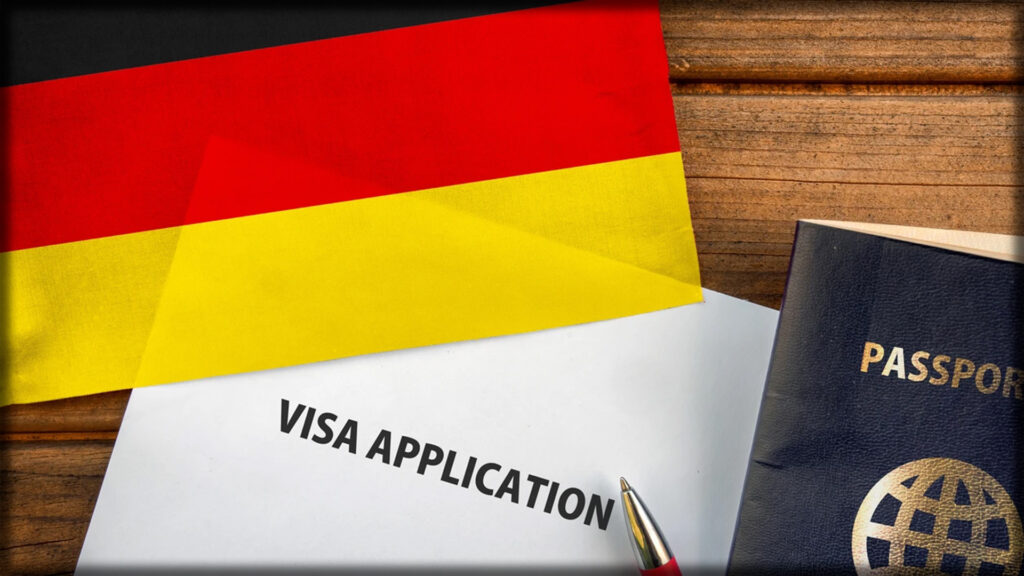How to Work in Germany with a Visa: Complete Guide 2025
Germany has become one of the most attractive destinations for immigrants worldwide. Its strong economy, shortage of local labor, and policies to attract talent make more and more foreigners ask the same question: How can I legally work in Germany in 2025?
The answer is not simple, but it’s absolutely achievable. With the right visa, proper preparation, and the correct documents, Germany can open the door to a stable professional and personal life.
This guide walks you through the essentials: the general requirements for obtaining a work visa, the step-by-step process, the benefits of working with a visa, and the most important considerations for immigrants planning to move to Germany.
General Requirements for a German Work Visa

Although each visa type (such as the EU Blue Card or Skilled Worker Visa) has specific requirements, some criteria are nearly universal:
- Valid Job Offer in Germany
You must have a signed contract or a formal offer from a registered German company. - Professional Qualification
- For skilled jobs: a recognized university degree or vocational training.
- For unskilled or temporary work: proven experience and willingness to train.
- Degree Recognition (Homologation)
Professions such as medicine, nursing, engineering, and teaching require official recognition by German authorities. - Language Requirements
- In healthcare and education: minimum B1 German.
- In technology/multinationals: English is often enough, but German will boost your opportunities.
- Valid Passport
At least six months of validity when applying. - Health Insurance
Mandatory from the first day in Germany. - Proof of Funds
Sometimes required to demonstrate financial solvency until your first paycheck.
👉 In short: Germany doesn’t just want workers; it wants qualified and documented workers.
Step-by-Step Process to Obtain a German Work Visa
- Find a Job
Apply via portals like Make it in Germany, EURES, StepStone, Indeed, or LinkedIn. Check if the employer has experience hiring foreigners. - Validate Your Degree (if applicable)
Check anabin.kmk.org to see if your degree is recognized. If not, begin the homologation process. - Gather Documents
- Job contract/offer letter.
- Valid passport.
- German-style CV (concise, professional, with a photo).
- Translated and legalized degrees/certificates.
- Health insurance.
- Proof of funds (if required).
- Schedule a Consulate Appointment
Fill out the official visa application and book your interview at the German Embassy/Consulate. - Pay Visa Fee
Standard fee is €75 (may vary depending on visa type). - Attend the Interview
The consular officer will review your documents, contract, and motivation. - Wait for Resolution
Processing usually takes 6–12 weeks. - Arrival in Germany
Register at the Einwohnermeldeamt (residence registration office) and apply for your residence permit at the Ausländerbehörde (Immigration Office).
👉 Each step matters. Even small mistakes in forms or interviews can delay your process for months.
Benefits of Working in Germany with a Visa
- Legal Employment: protection under German labor law.
- Financial Stability: salaries from €2,000 net/month in basic jobs to €5,000+ gross in specialized fields.
- Permanent Residency Options: EU Blue Card holders can apply after 33 months, or 21 months with B1 German.
- Public Services Access: healthcare, education, and social benefits.
- Family Reunification: spouses and children can often join you.
- Professional Prestige: German work experience is valued worldwide.

Types of German Work Visas
- EU Blue Card
- For highly qualified professionals with recognized university degrees.
- Salary minimum: ~€45,000 (or €39,000 for shortage fields like IT, healthcare, and engineering).
- Fast track to permanent residency.
- Skilled Worker Visa
- For vocational/technical training or recognized university degrees.
- Popular in nursing, mechanics, and electrical trades.
- Job-Seeker Visa
- Allows up to six months in Germany to find work.
- Requires proof of funds and health insurance.
- Does not allow immediate employment.
- Temporary/Seasonal Work Visa
- For agriculture, hospitality, tourism, or construction.
- Typically lasts 3–6 months.
- Vocational Training Visa (Ausbildung)
- For foreigners undertaking vocational training in Germany.
- Popular among young people without a university degree.
- Internship Visa
- For students or recent graduates accepted into German companies.
- Requires an internship contract and sometimes Federal Employment Agency approval.
👉 Germany tailors its visas to different profiles—from top professionals to students and seasonal workers. The key is to find the one that best fits your situation.
The Most In-Demand Jobs for Immigrants in Germany in 2025
Germany continues to face a chronic shortage of workers in key industries such as healthcare, engineering, and technology. For immigrants, this labor gap represents a major opportunity to secure stable and well-paid employment.
👉 If you want the full detailed list, check here:
👉 [The Most In-Demand Jobs for Immigrants in Germany in 2025]
German Work Visa: Requirements, Costs, and Steps
While the general requirements are similar across visa types, each has its own rules. For example, the EU Blue Card requires a minimum salary threshold, while the Job-Seeker Visa functions differently.
👉 For a step-by-step guide, read here:
👉 [German Work Visa: Requirements, Costs, and Steps]
How to Learn German Quickly to Get a Job in Germany
Some jobs let you start with only English, but German is the real key to better pay and long-term stability. Intensive courses, apps, and immersion programs can help you reach working proficiency within months.
👉 Learn how here:
👉 [How to Learn German Quickly to Get a Job in Germany]
Salaries in Germany: How Much Does an Expat Earn on Average?
The average salary in Germany is about €51,000 gross per year, though immigrants often start slightly lower. The good news: in sectors like healthcare and IT, the pay gap between locals and foreigners is minimal.
👉 Full details here:
👉 [Salaries in Germany: How Much Does an Expat Earn on Average?]
Jobs in Germany Without Speaking German
Don’t speak German yet? No problem. Opportunities exist in logistics, agriculture, construction, hospitality, and especially in international tech companies.
👉 Complete guide here:
👉 [Jobs in Germany Without Speaking German]
Temporary and Seasonal Jobs for Foreigners
A great first step into Germany’s labor market is through temporary jobs. Agriculture, tourism, logistics, and construction hire thousands of foreign workers every year.
👉 Discover how to apply here:
👉 [Temporary and Seasonal Jobs for Foreigners: Complete Guide 2025]
Common Mistakes When Applying for a German Work Visa
The most frequent errors include applying for the wrong visa type, failing to validate degrees, missing documents, and arriving unprepared for the consular interview.
👉 Learn all the mistakes and how to avoid them here:
👉 [Common Mistakes When Applying for a German Work Visa]
Frequently Asked Questions
Do I need to speak German to get a job in Germany?
It depends on the sector. In technology, international startups, and research, English is often enough. However, in fields such as healthcare, education, public administration, or customer service, German is usually mandatory. Even basic German can open more doors and improve your salary potential.
What level of German do I need for a work visa?
- Seasonal/basic jobs: A2 may be sufficient.
- Technical professions: B1 is recommended.
- Healthcare, teaching, medicine: B2 or higher is required.
- EU Blue Card: German is not always required, but it greatly helps with integration and permanent residency.
Can I enter as a tourist and then switch to a work visa in Germany?
No. A tourist visa cannot be converted into a work visa. You must return to your home country and apply from a German embassy or consulate. A legal option for job hunting inside Germany is the Job-Seeker Visa, which allows up to 6 months to search for work.
How much does a German work visa cost?
- Standard visa fee: €75.
- Additional expenses:
- Document translation/legalization.
- Degree recognition (approx. €200–600).
- Health insurance (€100/month).
👉 Total costs typically range between €400 and €1,000, not including flights or initial housing.
How long does it take for a work visa to be approved?
On average 6–12 weeks, but it can be longer depending on the embassy workload or case complexity.
Can I bring my family with me on a work visa?
Yes. With most work visas—especially the EU Blue Card—you can request family reunification. Your spouse will also receive a residence permit and, in most cases, the right to work in Germany.
How much does a foreign worker earn in Germany on average?
- Foreigners usually start around €3,000 gross per month.
- The overall German average is €4,300 gross per month.
- Salaries vary by sector:
- Tech/Healthcare: higher wages.
- Agriculture/Logistics: €1,800–€2,200 net per month.
👉 For full details: [Salaries in Germany: How Much Does an Expat Earn on Average?]
What happens if I lose my job in Germany?
You generally have up to 3 months to find a new job. If you can’t, your legal status may be revoked and you would need to return to your country.
Is it difficult to get degree recognition in Germany?
It depends. Technical professions are usually recognized faster, while medicine, law, and teaching can be more complex. The best resource is the official Anabin database to check if your degree is already recognized.
What if my work visa application is denied?
You can reapply, but you must:
- Pay the visa fee again.
- Fix the issues that led to rejection (missing documents, unrecognized degrees, wrong visa choice, etc.).
Working in Germany in 2025 is not only possible—it’s within reach if you have the right information, patience, and preparation. Meeting the requirements, following the application steps carefully, and choosing the right visa type are the foundation for success.
Whether you start with a temporary job, a role in a high-demand sector, or a position in technology without German skills, each path can lead to long-term stability.
👉 Remember: the work visa is not just a piece of paper—it’s the key to a new life in one of the most advanced economies in the world.